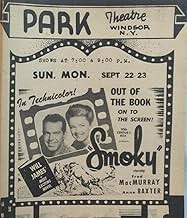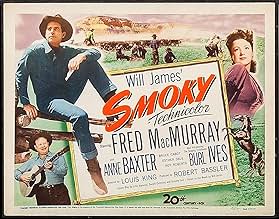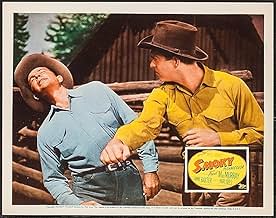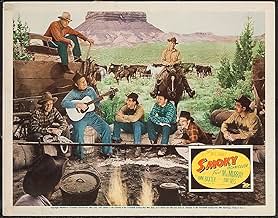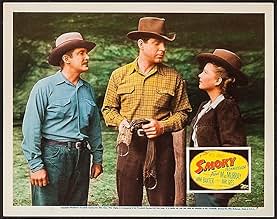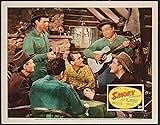Adicionar um enredo no seu idiomaDrama about the strong bond between a cowpoke and a wild bronco set during the 1940s.Drama about the strong bond between a cowpoke and a wild bronco set during the 1940s.Drama about the strong bond between a cowpoke and a wild bronco set during the 1940s.
- Direção
- Roteiristas
- Artistas
Robert Adler
- Scrubby
- (não creditado)
Chris Allen
- Parade Spectator
- (não creditado)
Stanley Andrews
- Rancher
- (não creditado)
Herman Belmonte
- Parade Spectator
- (não creditado)
Herman Boden
- Parade Spectator
- (não creditado)
Rudy Bowman
- Parade Spectator
- (não creditado)
Harry Carter
- Bud
- (não creditado)
Heinie Conklin
- Parade Spectator
- (não creditado)
Frank Darien
- Junk Yard Owner
- (não creditado)
Avaliações em destaque
10togfoguy
I saw this movie as a pre-teen when it was first released and it has been one of my favorite films among the hundreds I have seen. Bring along the kleenex for this movie will bring tears to the eyes of everyone.
I have been looking for this film on DVD or VHS for at least 10 years. This is one of the best horse movies of all time. It is joyful and tearful, but a story of intense love for a horse. About a black stallion that Fred Mac Murray names "Smoky" because where there is fire there is Smoke. This story needs to be released in Digital DVD format. I have been a movie collector for over 45 years, this is one that everybody should see. A true family picture that displays a great tenderness, love, devotion, and courage that you will always remember. The stars Fred Mac Murray, Anne Baxter, and Burl Ives are at their best in their performances. Burl Ives a sings "Jimmy Crack Corn and I Don't Care" which fits the horse ranch fare.
Like "Lassie come home", if there is a movie i'll always remember, it is indeed the lovable "Smoky" and his loyal master McMurray.Fifty years ago, alone in a theater watching the film, having a hard time to see the screen because the tears in my eyes blurred the only scene i could never forget. I think it's near the end, when the true love of McMurray for his animal and Smoky's attachment for his real friend, burst you out of emotions. Glad i was alone, no one could laugh at me. The day after, when i narrated to my young friend, between the double features I have seen: "Going my way" with Bing Crosby as a priest, and "Smoky", i preferred and enjoyed by 200 yards, the latter, he did not understand why... Since many years, i searched as hard as Fred for his horse, without any luck to find the DVD or VHS. May be he did not pass my way yet! Or i have not cross their path. But one thing i am sure: no other horse did or never will surpass him on any screen.
"Smoky" is quintessential family fare, with no surprises or plot twists; As a reader remarked, "man finds horse, man loses horse, man finds horse". Is it my imagination or are many horse stories similar? "War Horse" and "Black Beauty" had much the same theme as "Smoky".
In this one, Fred MacMurray arrives at a ranch under a cloud of suspicion. His cowboy credentials are impeccable, but some ranch hands have heard stories. All goes well until Bruce Cabot shows up and pleads with Our Hero to get him a job. But it turns out that Cabot is his ne'er-do-well brother, and Fred took the rap for him in another state. Fred has, meanwhile, found and broken a wild horse that is the envy of the local horsemen. Cabot finds the horse 'ornery' and despises it. Naturally, things happen, Fred and the horse are separated, and the horse ends up with - you guessed it, Cabot. From here you can fill in the blanks.
The movie, filmed in and around Utah's Zion National Park, is gorgeous to look at while the movie itself has a very pedestrian feel. No new ground is broken in the story and co-star Anne Baxter has very little to do despite being the manager of the ranch. Burl Ives gets to sing some songs in the bunkhouse. Kids will like this picture more than adults will, and it is a pleasant way to spend 90 minutes.
In this one, Fred MacMurray arrives at a ranch under a cloud of suspicion. His cowboy credentials are impeccable, but some ranch hands have heard stories. All goes well until Bruce Cabot shows up and pleads with Our Hero to get him a job. But it turns out that Cabot is his ne'er-do-well brother, and Fred took the rap for him in another state. Fred has, meanwhile, found and broken a wild horse that is the envy of the local horsemen. Cabot finds the horse 'ornery' and despises it. Naturally, things happen, Fred and the horse are separated, and the horse ends up with - you guessed it, Cabot. From here you can fill in the blanks.
The movie, filmed in and around Utah's Zion National Park, is gorgeous to look at while the movie itself has a very pedestrian feel. No new ground is broken in the story and co-star Anne Baxter has very little to do despite being the manager of the ranch. Burl Ives gets to sing some songs in the bunkhouse. Kids will like this picture more than adults will, and it is a pleasant way to spend 90 minutes.
Yes, the original Smokey is a classic, now almost a period piece. I'm almost 70 (February 1939), and believe I saw this movie on the week it was released. I think it was my first movie.
Yes, it's a beautiful, memorable, and sad story, especially when you're that young. I cried like I did with Bambi, but for this and a number of other reasons -- not the least of which are Fred McMurray's strong lead, Burl Ive's great renditions of what I believe are some of our most authentic American folk songs (e.g., "The Blue Tail Fly"), and Smokey a beautiful horse for a lasting concept of character that bonds independent loving humans to independent loving animals -- it compels me to ask who, having seen it, could ever forget it?
Does 20 Century Fox keep masters even when they're succeeded by remakes? If so, I'd sure like to get my hands on a copy of the original. Having Googled and Cuiled for this information without any success on and off over the past year and a half, I was beginning to wonder if there might not be other intentional reasons for this film's disappearance.
Conceivably, as it was produced in the '40s, the original Smokey may have contained language or stereotypes now recognized, rightly or wrongly, as politically incorrect. I may have been too young to recognize anything of this kind. More likely, Burl Ive's, like so many folk collectors, scholars and performers, was once blacklisted by Congress, the movie industry, and other witch hunting institutions because of alleged associations with "communists." Is the movie industry trying to protect us from our/their past? On the other hand, if the film's disappearance is, in fact, a casualty of such black listing or attempts at social engineering, it deprives us from seeing, and remembering, ourselves as we once were. In this case, the original Smokey needs to be re-released for its historical import at least. It is an American original.
Yes, it's a beautiful, memorable, and sad story, especially when you're that young. I cried like I did with Bambi, but for this and a number of other reasons -- not the least of which are Fred McMurray's strong lead, Burl Ive's great renditions of what I believe are some of our most authentic American folk songs (e.g., "The Blue Tail Fly"), and Smokey a beautiful horse for a lasting concept of character that bonds independent loving humans to independent loving animals -- it compels me to ask who, having seen it, could ever forget it?
Does 20 Century Fox keep masters even when they're succeeded by remakes? If so, I'd sure like to get my hands on a copy of the original. Having Googled and Cuiled for this information without any success on and off over the past year and a half, I was beginning to wonder if there might not be other intentional reasons for this film's disappearance.
Conceivably, as it was produced in the '40s, the original Smokey may have contained language or stereotypes now recognized, rightly or wrongly, as politically incorrect. I may have been too young to recognize anything of this kind. More likely, Burl Ive's, like so many folk collectors, scholars and performers, was once blacklisted by Congress, the movie industry, and other witch hunting institutions because of alleged associations with "communists." Is the movie industry trying to protect us from our/their past? On the other hand, if the film's disappearance is, in fact, a casualty of such black listing or attempts at social engineering, it deprives us from seeing, and remembering, ourselves as we once were. In this case, the original Smokey needs to be re-released for its historical import at least. It is an American original.
Você sabia?
- CuriosidadesHorse trainer Jack Lindell found and trained the horse who played Smoky for three months. He would stand behind the camera and use a series of signals with sticks, somewhat like semaphore, to control the horse's behavior.
- Erros de gravaçãoWhen Smoky is dragging a wounded Clint, the horse is plainly dragging a dummy, as evidenced by the stiffness of the 'body' and, in one instance, by the dummy's hand getting caught on the stirrup, leaving the crooked arm poking up into the air in an extremely unnatural position.
- Citações
Willie: Looks like some busted ribs -
[to unconscious Clint]
Willie: does it hurt to breathe?
Julie Richards: Keep quiet, honey.
- ConexõesFeatured in Furacão Negro (1966)
Principais escolhas
Faça login para avaliar e ver a lista de recomendações personalizadas
Detalhes
Bilheteria
- Orçamento
- US$ 1.300.000 (estimativa)
- Tempo de duração
- 1 h 27 min(87 min)
- Proporção
- 1.37 : 1
Contribua para esta página
Sugerir uma alteração ou adicionar conteúdo ausente

